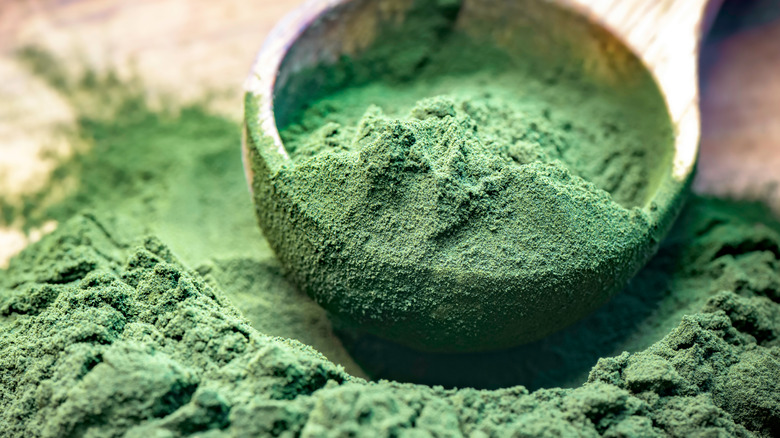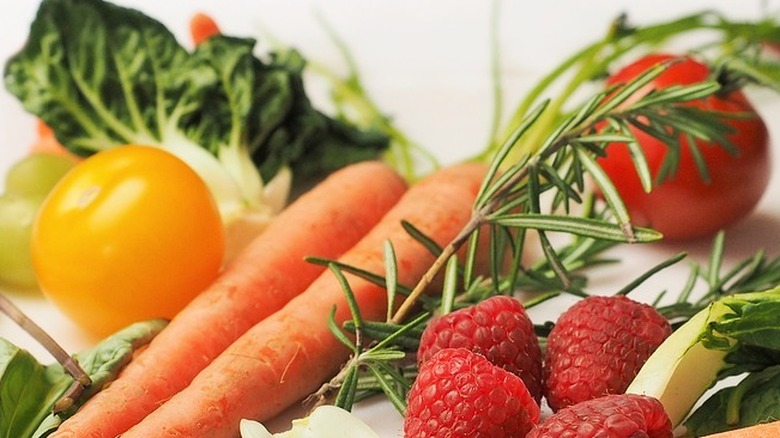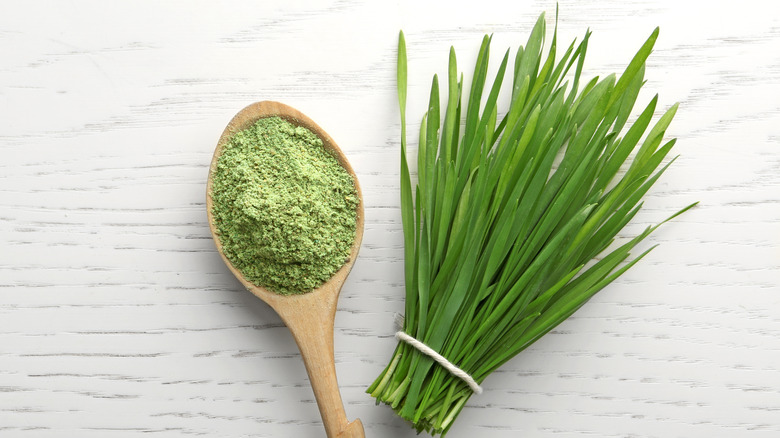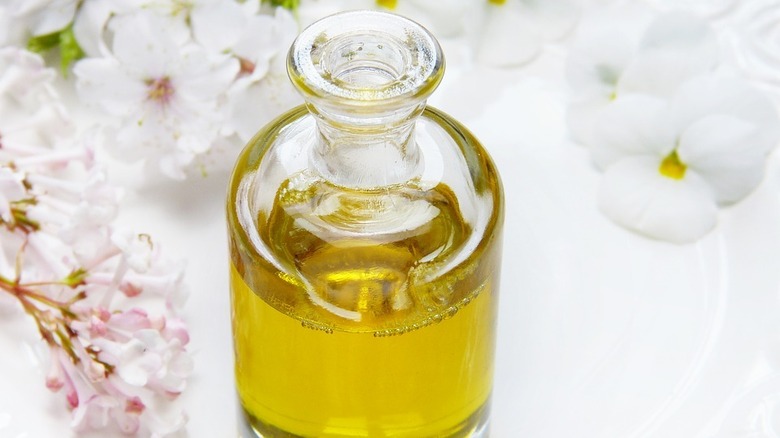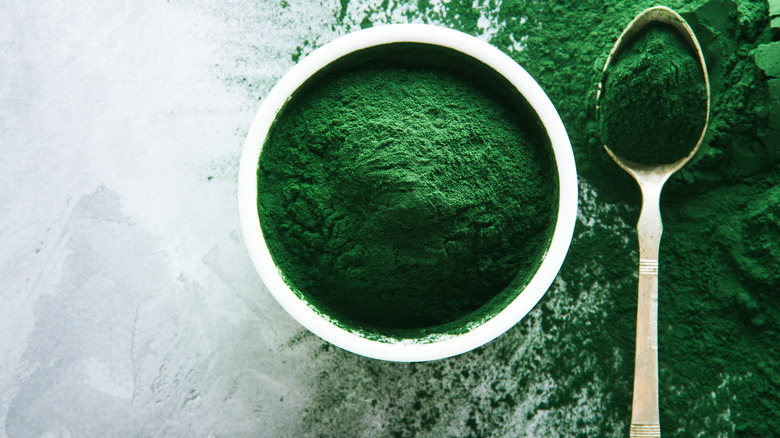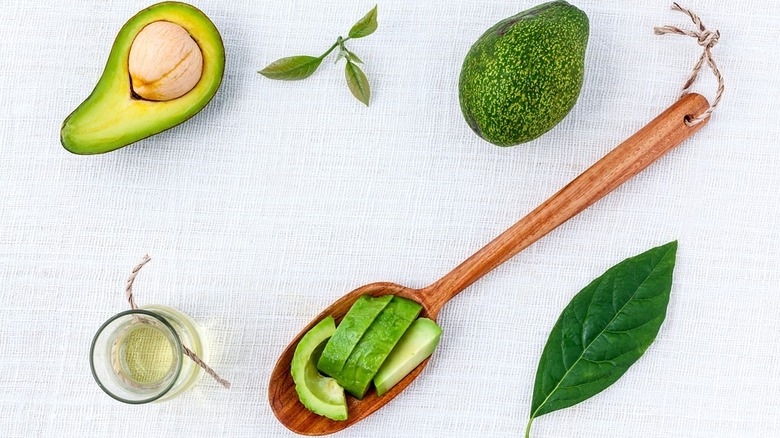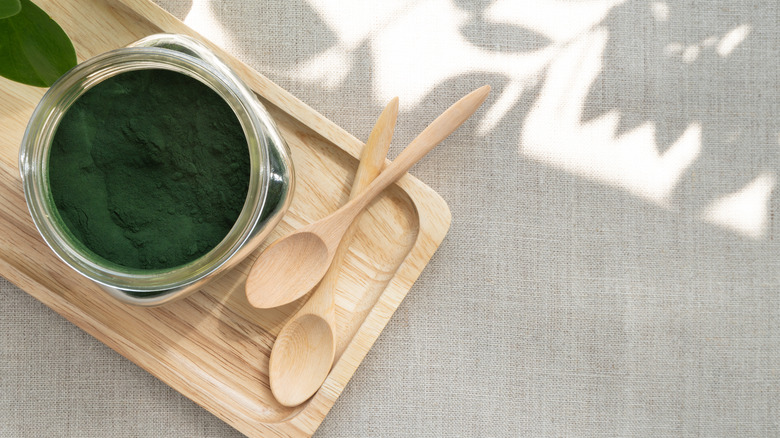Everything You Need To Know About Greens Powders
In the hustle of daily life, we're all looking for ways to add a little more ease to our days. Even for the most disciplined among us, it can be challenging to answer all of those emails, attend all of those meetings, run all of those errands, tidy up our spaces, and then somehow make sure to get in the USDA's recommended 5 to 9 servings of fruits and vegetables per day. We all deserve little shortcuts sometimes — those small life hacks that can make it a whole lot easier to achieve our optimal health level and reach our goals: and greens powders might just be one of those wonderful shortcuts.
Greens powders, which are pre-mixed blends of finely ground vegetables often with some fruits added in, are used by many to supplement daily fruit and vegetable intake. The powders may come in a large tub or glass, similar to the way many protein supplements are packaged, or they may come in convenient, smaller pre-measured packets. Either way, it's usually as simple as adding the serving of powder to a liquid. But are they as great as they seem?
Greens powders can include a wide range of fruits and vegetables
Depending on the greens powder mix you select, you can expect a pretty large range of fruits and vegetables in your drink. Some of the most popular brands are Amazing Grass and Garden of Life.
Amazing Grass' Superfood Greens Blend includes a variety of grasses (wheatgrass, barley grass, and alfalfa grass), leafy greens, and fruits and veggies like broccoli, pineapple, and raspberries. Garden of Life's Raw Organic Perfect Food Superfood Juiced Greens powder also includes barley grass, alfalfa grass as well as oat grass juice, wheatgrass juice, and a variety of fruits and vegetables.
Just imagine trying to get such a range of fruits and vegetables through whole foods alone in one day! It would certainly be difficult. For an added bonus, greens powders typically have such a large array of fruits and vegetables included that, even if you don't love the taste of one ingredient on its own (we're looking at you, wheatgrass!), you probably won't even taste it. Yes, you can get plenty of your veggies in even if you don't usually love them all!
Greens powders may give you a major boost of nutrients across the board
In addition to boasting a few leafy vegetables, fruits, and grasses, greens powders often contain sprouts, probiotics, digestive enzymes, nutritional extracts, and herbs. Many brands offer organic or non-GMO ingredients to further enhance the quality of the nutrient panel. These powders may also be vegan.
While the exact nutritional profile will vary by brand, WebMD says you can expect the following nutritional profile from one tablespoon of a greens powder: 45 calories, 3 grams of protein, 6 grams of carbohydrates, 18% of your daily value of iron, and 60% of your daily intake of vitamin A.
Vitamin A can have an anti-inflammatory effect on your body and may help boost your immune system. All of those leafy greens are a jolt to your Vitamin K levels, too, meaning you'll potentially boost your eye and brain health. It's also possible you'll get a boost of calcium and potassium, which may help you maintain healthy blood pressure.
According to Healthline, a typical scoop of greens powder also contains 80% of the recommended amount of Vitamin C, 100% of iodine, and 70% of selenium. If you have any gaps in your diet, greens powders may just be able to help.
The nutrients in greens powders are bioavailable
With all of these potential nutrient boosts, you may be wondering how soon you'll be able to reap the benefits. The good news is: it might just be immediate, at least in terms of bioavailability.
While the long-term impacts of your fruit and vegetable intake have to be measured over long ranges of time, greens powders tend to contain quickly absorbable nutrients, meaning that they're typically bioavailable — just steer clear of additives, advises U.S. News & World Report, as they can inhibit bioavailability.
If you're considering adding a greens powder to your daily routine, think about adding it at a time in your day when you might want to get those nutrients swirling around in your bloodstream. For many, this means first thing in the morning, alongside your coffee or tea. Others might like to add a greens powder boost midday, after lunch, when your energy typically tends to slump.
Greens powders may improve your digestion
Many of us could use a little help in the digestion department, and greens powders may be one way to supplement your digestive health. If you choose a greens powder that includes probiotics, prebiotics, and/or digestive enzymes, you might find improvements over time in your digestive health profile. Many greens powders include a blend of plant-based digestive enzymes such as protease, amylase, cellulase, lipase, papain.
Garden of Life's Raw Organic Perfect Food Superfood Juiced Greens Powder includes a probiotic and enzyme blend that includes 30 milligrams of lipase, protease, aspergillopepsin, beta-glucanase, cellulase, as well as lactobacillus acidophilus, plantarum, and bulgaricus at 1.5 Billion CFU, plus other ingredients. Some science shows that the probiotics and prebiotics added to greens powders can be more helpful; however, the benefits of adding digestive enzymes to powders are somewhat less clear (via Healthline). As you should with any new supplement, be sure to consult your doctor before trying greens powder.
Adding a dash of healthy fat to your greens powders can give you an extra boost
If you decide to add a greens powder to your daily health routine, you may also consider that adding a bit of fat to your mix might help increase the absorption of certain fat-soluble vitamins. "I suggest blending the powder into a smoothie for optimal taste and consistency," registered dietitian Eliza Savage told Verywell Fit. "Add a source of healthy fat, such as nut butter, chia seeds, or avocado, to your smoothie to help absorb the fat-soluble vitamins in the powder."
This tactic is advisable if you're blending your greens powders in with other ingredients rather than taking the greens powder with juice or water, but you can also add a splash of liquid fat, such as MCT oil or liquid coconut oil — as long as you can stomach it.
Greens powders aren't just for drinking
Since greens powders can be added to your diet in so many different ways you'll never tire of them! In fact, greens powders can really be added to almost anything savory you make, especially if it's a particularly rich dish.
If you'd rather not drink your greens powder, add a dash over your vegetables, add a teaspoon to your omelet mix, or whip them into your salad dressings, sauces, dips, or soups. However, if you're trying to pack every bit of nutrient power from your greens powder, stick to raw combinations (such as uncooked salad dressings) as the powder will lose a little of its power when cooked.
If you choose a greens powder that is particularly fruit-heavy or on the sweeter side, you may want to use your greens powders in creative ways that play up the sweeter taste. Do you like desserts (and who doesn't)? Try blending a bit of your greens powder into an avocado pudding, or try a chia pudding, which can be eaten for dessert or breakfast. Speaking of breakfast, sweeter greens powders can be mixed into oatmeal for a filling breakfast or snack. If you have the time to make your own, whip up energy balls with greens powders for an easy and ultra-portable snack.
Watch out for added sugar in greens powders
While greens powders are obviously an awesome way to save time, up your fruit and vegetable intake, and potentially boost your health and nutrition, there are a few add-ons to consider avoiding when choosing your favorite greens powder brand. Especially considering that you're most likely to add your greens powders to smoothies, juices, or dishes, there's usually no reason to have any added sugars in your greens powder blend.
"Look for powders with little to no added sugars and avoid any products with artificial sweeteners, with the exception of stevia or monk fruit," registered dietitian Sydney Greene advised in an article for Verywell Fit. If you choose a greens powder without any sugar added at all, you can always add your own dash of sugar if needed — and that way you are in full control of the amount you consume alongside your greens.
Greens powders shouldn't replace whole foods in your diet
While greens powders are really incredible supplements, ideally, they should not replace whole foods in your diet. Whole foods, with all of their multiple benefits, are really always going to be your best choice.
"There's two things that are missing from these superfood powders: the water content which real vegetables contain, and the dietary [fiber] which is abundant in all vegetables, both the soluble and insoluble types," dietitian Jemma O'Hanlon told HuffPost. "The water content and the dietary [fiber] interact together in our bodies to help us feel fuller for longer. These are the missing links in these superfood powders, and although they might claim to provide a dictionary of vitamins and minerals, we're missing out on the whole satiety factor that we get from eating real veggies."
In other words, the whole food option is always going to be the most nutritious version of whatever fruit or vegetable you're consuming. So, reach for greens powder as a supplemental add-on, a daily or occasional boost, or a convenient option when traveling, but turn back to tried-and-true whole foods as much as your schedule and budget can handle.
Start slow and don't overdo it
It's entirely possible to overdo it on greens powder, so take caution when embarking on this new routine. Start slow, as greens powders can be hard on the stomach. "Kale when eaten raw or in raw powder form, for example, can be quite tough on digestion, leading to tummy cramps and bloating in some sensitive individuals," nutritionist Fiona Tuck told HuffPost.
Over the longer term, you may also risk creating an imbalance of your vitamin intake by getting too much of a certain nutrient. "There are some vitamins that we can actually have too much of, and if we have too much it can lead to toxicity in the body," dietitian Jemma O'Hanlon explained to HuffPost. "For example, too much vitamin A can lead to hypercarotenemia, which is a yellow discoloration of the skin."
In any case, certainly never go over the recommended serving size, and don't use greens powders more than once a day to start. It may make sense to try greens powders as an every-other-day supplement, or even take once per week, and, after a month or so of regular intake, consult with your doctor about checking your vitamin levels to make sure nothing is on its way to going overboard.
Tell your doctor about your greens powder intake
Although greens powders are considered a dietary supplement, you should still inform your doctor if you've started taking them. This is even more important if you take prescription medications of any kind. As WebMD explained, vitamin K, which is often found in greens powders, can interact with cholesterol-controlling medications, antibiotics, and anticoagulants — just to name a few.
You surely don't want to change the way your body interacts with any existing medications you take, so it's key to share your supplement intake information with your medical team. Semi-regular blood tests that include vitamin panels can be helpful in making sure you're not getting too much of any one vitamin. And, of course, be sure to stop consuming greens powders and speak to your doctor if you notice any negative changes in your health after consuming it.
Choose your greens powders carefully
Because greens powders are considered dietary supplements, they are therefore not regulated by the Food and Drug Administration (FDA) in the same way prescription drugs are. Thus, the FDA advises, "Before making decisions about whether to take a supplement, talk to your healthcare provider. They can help you achieve a balance between the foods and nutrients you personally need."
If you get the all-clear from your doctor, choose a reputable brand. "Avoid brands that use marketing buzzwords like 'natural' which are not regulated, unless the product has other certifications," registered dietitian Sydney Greene advised in an article for Verywell Fit. "You'll also want to pay attention to third-party testing certifications, which generally test for purity and potency."
Brands with certified organic ingredients may offer a leg up on the competition, as they will have undergone the USDA's requirements for organic farming and/or sourcing. Greene also advises scanning the entire list of ingredients on the label. "Go for products that have ingredients you recognize that are whole, real foods," she added. Your doctor or a registered dietitian can also help you assess the product and choose the best brand possible.

